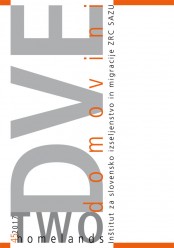The Balkan Road and the Guarding of Europe: The Refugee Crisis on the Borders of Slovenia
DOI:
https://doi.org/10.3986/dd.2017.1.10Keywords:
refugees, the Balkan road, borders, strangers, Slovenia, precariousnessAbstract
The article investigates public reactions to the refugee crisis in the autumn of 2015. The focus is on the emerging “post-Schengen” imaginaries of the border which are formed in reaction to the actions by the member states at the periphery (Hungary, Croatia) and in the centre’s alleged expectations that the external borders of the EU will be protected. In this constellation, Slovenia assumes the role of the border guard of Europe, which is based on the memories of the 20th century, in particular of the ascribed traumatic legacy of being part of the socialist bloc. The theoretical argument derived from the study emphasises the importance of historical treatments of public perceptions about political community, borders and solidarity, as well as the need for localized analyses of popular beliefs of belonging which stem from the regional histories.
Downloads
References
Agamben, Giorgio (2004). Homo Sacer. Ljubljana: Koda.
Andersson, Ruben (2014). Illegality, Inc.: Clandestine Migration and the Business of Bordering Europe. Los Angeles, Berkeley: University of California Press.
Balibar, Ėtienne (2003). We, the People of Europe? Reflections on Transnational Citizenship. Princeton University Press.
Baird, Ian G., Le Billon, Phillippe (2012). Landscapes of Political Memories: War Legacies and Land Negotiations in Laos. Political Geography 31, 290–300.
Bauman, Zygmunt (2011). Collateral Damage: Social Inequalities in a Global Age. Cambridge: Polity Press.
Bauman, Zygmunt (2016). Strangers at our doors. Cambridge: Polity.
Brown, Wendy (2010). Walled States, Waning Sovereignty. New York: Zone Books.
Bryant, Rebecca (2016). On Critical Times: Return, Repetition and the Uncanny Present. History and Anthropology 27/1, 19–31.
Bučar Ručman, Aleš (2016). Družbeno nadzorstvo in mednarodne migracije: Analiza nadzorstva od globalne do lokalne poti. Dve domovini / Two Homelands 43: 11–22.
Butler, Judith (2004). Precarious Life: The Power of Mourning and Violence. London: Verso.
Calavita, Kitty (2005). Immigrants at the Margins: Law, Race and Exclusion in Southern Europe. Cambridge: Cambridge University Press.
Carr, Matthew (2015). Fortress Europe: Inside the War Against Immigration. London: C. Hurst & Co. Publishers.
Forrester, Sibelan, Zaborowska, Magdalena J., Gapova, Elena (eds.) (2004). Over the Wall/ After the Fall: Post-Communist Cultures Through and East-West Gaze. Bloomington, Indianapolis: Indiana University Press.
Habermas, Jürgen (2012). The Crisis of the European Union: A Response. Cambridge: Polity.
Jensen, Ole B., Richardson, Tim (2004). Making European Space: Mobility, Power and Territorial Identity. London: Routledge.
Kanduč, Zoran, Bučar Ručman, Aleš (2016). Razredna vojna, delo in migracije: Primer delavcev migrantov v Sloveniji. Dve domovini / Two Homelands 43: 77–89.
Knight, Daniel, Stuart, Charles (2016). Ethnographies of Austerity: Temporality, Crisis and Affect in Southern Europe. History and Anthropology 27/1, 1–18.
Kymlicka, Will (2015). Solidarity in Diverse Societies: Beyond Neoliberal Multiculturalism and Welfare Chauvinism. Comparative Migration Studies 3/17, DOI 10.1186/s40878-015-0017-4.
Lipovec Čebron, Urška, Zorn, Jelka (2016). Avtonomija in nadzor migracij v evropskih »tamponskih conah«. Dve domovini / Two Homelands 43: 61–75.
Marotta, Vince P. (2010). The Cosmopolitan Stranger. Questioning Cosmopolitanism (eds. Stan Van Hooft, Wim Vandekerckhove. Netherlands: Springer: 105–120.
McCormack, Donna, Salmenniemi, Suvi (2016). The Biopolitics of Precarity and the Self. European Journal of Cultural Studies 19/1, 3–15.
Melossi, Dario (2003). ‘In a Peaceful Life’: Migration and the Crime of Modernity in Europe/ Italy. Punishment and Society 4, 371–397.
Mezzadra, Sandro, Neilson, Brett (2013). Border as Method, or the Multiplication of Labor. Durnham, London: Duke University Press.
Mignolo, Walter D., Tlostanova, Madina V. (2006). Theorizing from the Borders: Shifting to Geo- and Body-Politics of Knowledge. European Journal of Social Theory 9/2, 205–221.
Mihelj, Sabina (2004). Negotiating European Identity at the Periphery: Media Coverage of Bosnian Refugees and ‘Illegal Migration’. European Culture and the Media (eds. Ib Bondebjerg, Peter Golding). Bristol: Intellect Books, 165–189.
Nail, Thomas (2016). The Figure of the Migrant. Stanford: Stanford University Press.
Newman, Dennis (2006). Border and Bordering: Towards an Interdisciplinary Dialogue. European Journal of Social Theory 9/2, 171–86.
Nicolson, Michelle, Andreotti de Oliviera, Vanessa, Mafi, Boby Fortune (2016). The Unstated Politics of Stranger Making in Europe: A Brutal Kindness. European Journal of Cultural Studies 19/4, 335–351.
Nuhoğlu Soysal, Yasemin (1994). Limits of Citizenship: Migrants and Postnational Membership in Europe. Chicago, London: The University of Chicago Press.
Pajnik, Mojca (2016). ‘Wasted Precariat’: Migrant Work in European societies. Progress in Development Studies 16/2, DOI 10.1177/1464993415623130.
Pavlakovich Kochi, Vera, Morehouse, Barbara, Wastl Walter, Doris (2004). Challenged Borderlands: Transcending Political and Cultural Boundaries. Aldershot: Ashgate.
Petrović, Tanja, (2009). Dolga pot domov: Reprezentacije zahodnega Balkana v političnem in medijskem diskurzu. Ljubljana: Mirovni inštitut.
Robinson, William I. (2009). Saskia Sassen and the Sociology of Globalization: A Critical Appraisal, http://www.soc.ucsb.edu/faculty/robinson/Assets/pdf/Saskia%20Sassen.pdf. (20. 2. 2017).
Sassen, Saskia (2014). Expulsions: Brutality and Complexity in the Global Economy. The Belknap Press of Harvard University Press.
Schippers, Thomas (2003). Sameness and Otherness: A View from France, Zuwanderung und Integration (eds. Christoph Köck, Alois Moosmüler). München: Waxmann, 42–50.
Squires, Judith, (2002). Terms of Inclusion: Citizenship and the Shaping of Ethnonational Identities. Ethnonational Identities (eds. Steven Fenton, Stephen May). London: Palgrave, 227–251.
Štiks, Igor (2010). A ‘Laboratory of Citizenship’: Shifting Conceptions of Citizenship in Yugoslavia and its Successor States«, CITSEE Working Papers, http://www.law.ed.ac.uk/file_download/series/179_alaboratoryofcitizenshipshiftingconceptionsofcitizenshipinyugoslaviaanditssucces.pdf. (20. 2. 2017).
Todorova, Maria (2001). Imaginarij Balkana. Ljubljana: ICK.
Velikonja, Mitja (2005). Euroza – Kritika novega eurocentrizma. Ljubljana: Mirovni inštitut.
Vidmar Horvat, Ksenija (2009). Zemljevidi vmesnosti: Evropska kultura im identiteta po koncu hladne vojne. Ljubljana: Sophia.
Walters, William (2006). Border / Control. European Journal of Social Theory 9/2: 187–203.
Downloads
Published
How to Cite
Issue
Section
License

This work is licensed under a Creative Commons Attribution-NonCommercial-NoDerivatives 4.0 International License.
Authors guarantee that the work is their own original creation and does not infringe any statutory or common-law copyright or any proprietary right of any third party. In case of claims by third parties, authors commit their self to defend the interests of the publisher, and shall cover any potential costs.
More in: Submission chapter





